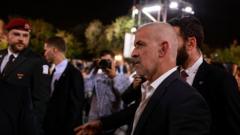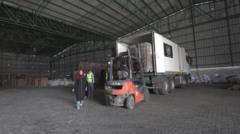Israel's blockade of Gaza is scrutinized amidst humanitarian crises as hearings begin at the World Court.
Israel Under Fire at World Court for Gaza Aid Restrictions

Israel Under Fire at World Court for Gaza Aid Restrictions
The UN critiques Israeli actions at the International Court of Justice, sparking international attention.
Israel is facing strong criticism at the International Court of Justice (ICJ) in The Hague for its ongoing blockade of humanitarian aid to the Gaza Strip. The United Nations has presented a case that highlights the dire consequences for Palestinian civilians, who have suffered immensely due to the blockade instituted over a month and a half ago. Israel declined to send a legal team to the hearings, denouncing the proceedings as biased against it.
The blockade was implemented as a strategy to compel Hamas to release Israeli hostages, as Israel maintains that the region has sufficient supplies despite the prohibition on essential goods. However, the UN and various humanitarian organizations assert that this action exacerbates an already catastrophic situation for the people of Gaza, who have been living through intense conflict for over a year and a half. This ongoing war has resulted in substantial loss of life, with tens of thousands killed and millions displaced.
During a temporary ceasefire in January, aid was permitted to enter Gaza, providing some relief, but that brief respite ended quickly. Since the blockade began on March 2, no humanitarian supplies—essential for survival—have been allowed in. On the opening day of the hearings, Elinor Hammarskjöld, a senior UN attorney, addressed the court, stating, "No humanitarian aid or commercial goods have been allowed into Gaza since 2nd of March, which has devastating humanitarian consequences."
The UN General Assembly had previously requested the court to issue an advisory opinion regarding Israel’s responsibilities to allow humanitarian aid to Palestinians. Throughout the hearings that will span five days, around 40 nations are anticipated to contribute their perspectives. A conclusive opinion from the ICJ is not expected for some time, leaving many in anticipation of the court's response to such pressing humanitarian concerns.
The blockade was implemented as a strategy to compel Hamas to release Israeli hostages, as Israel maintains that the region has sufficient supplies despite the prohibition on essential goods. However, the UN and various humanitarian organizations assert that this action exacerbates an already catastrophic situation for the people of Gaza, who have been living through intense conflict for over a year and a half. This ongoing war has resulted in substantial loss of life, with tens of thousands killed and millions displaced.
During a temporary ceasefire in January, aid was permitted to enter Gaza, providing some relief, but that brief respite ended quickly. Since the blockade began on March 2, no humanitarian supplies—essential for survival—have been allowed in. On the opening day of the hearings, Elinor Hammarskjöld, a senior UN attorney, addressed the court, stating, "No humanitarian aid or commercial goods have been allowed into Gaza since 2nd of March, which has devastating humanitarian consequences."
The UN General Assembly had previously requested the court to issue an advisory opinion regarding Israel’s responsibilities to allow humanitarian aid to Palestinians. Throughout the hearings that will span five days, around 40 nations are anticipated to contribute their perspectives. A conclusive opinion from the ICJ is not expected for some time, leaving many in anticipation of the court's response to such pressing humanitarian concerns.

















